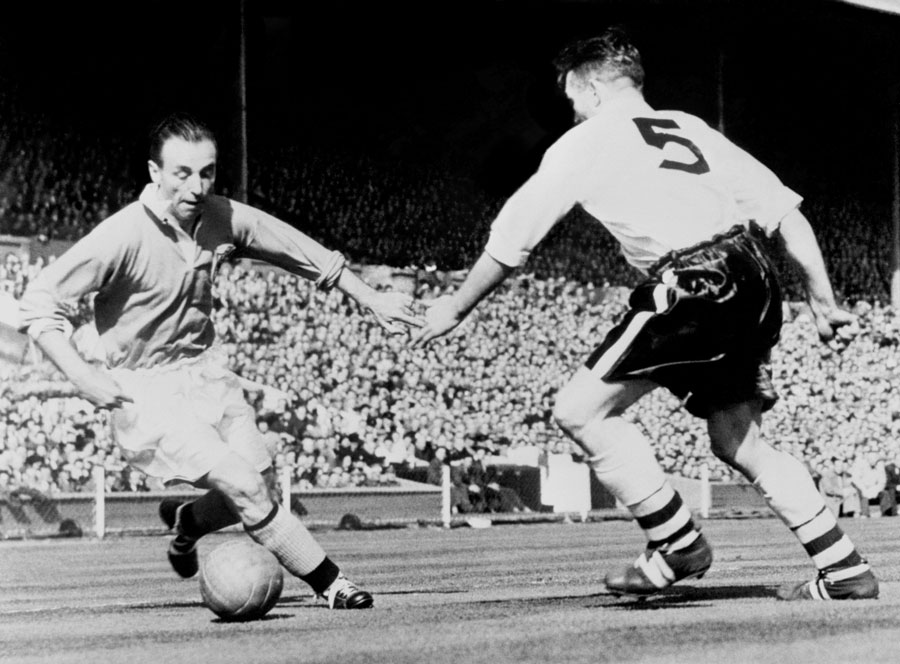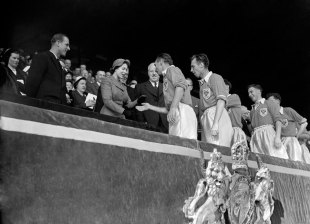- Rewind to 1953
Evergreen Stan stuns Wembley

On May 2 1953, Blackpool winger Stanley Matthews - one of football's finest ever players - delivered the performance that crowned his long career when he inspired a dramatic comeback to finally lift the FA Cup as Blackpool beat Bolton 4-3 at Wembley.
In 1953, the great Stanley Matthews reached the age of 38. He was by that stage well established as one of the finest footballers on the planet, but he had yet to win the English game's greatest prize.
His peak years as a player had been lost to the Second World War when he served in the Royal Air Force, and his return to top-class action did not come until he was 30-years-old.
It was shortly after that return that he ended his lifelong association with Stoke City. He had made his first-team debut there as a 17-year-old in 1932, but in 1947 took the decision to leave for Blackpool. There were numerous reasons.
As well as a falling-out with Stoke manager Bob McGrory, he had relocated to Blackpool during the war, setting up a hotel there, and had represented the Seasiders in wartime matches. (He had also developed a friendship with Blackpool forward Stan Mortensen: it has emerged in recent years that the England pair had been arrested when they attempted to sell black market goods during a tour of Belgium in 1945).
At the time of his transfer request, there had been speculation that the 32-year-old could hang up his boots if his wish was not granted. When the £11,500 transfer was eventually sealed, his new manager at Blackpool, Joe Smith, had said: "You're 32. Do you think you can make it for another couple of years?"

He answered in the affirmative. In his first season, he helped Blackpool to their first ever FA Cup final, where they were beaten 4-2 by Matt Busby's Manchester United, and also claimed the inaugural Football Writers' Association Footballer of the Year award. In 1950, at the age of 35, he was part of the England squad for the World Cup. In 1951, he helped Blackpool to a second FA Cup final, this time losing 2-0 to Newcastle United, despite his stirring performance.
It had been Matthews' lifetime ambition to lift the cup - then the most prized trophy in club football - but, with those defeats, he appeared resigned to the belief his chance had passed him by. So it was that when, in December 1952, relegation-threatened Stoke made a £12,000 bid to re-sign him, his head was turned. "I said to myself: 'Well, if only for sentimental reasons, it will be nice to go back to my hometown and play for City again'," he told the Daily Mirror that month.
However, Blackpool rejected the bid, insisting they didn't want to lose "the best box office draw in the game", and Smith encouraged him to believe that he could still achieve his dreams. "Even though you're 37, I believe your best football is still to come," he said.
Matthews, who had been out injured since October, returned to fitness a couple of weeks later, and looked to have taken his manager's words to heart. His comeback had come in Blackpool's 2-1 FA Cup third-round victory over Sheffield Wednesday, and he looked reborn. "Matthews is clearly a greater player than ever," the Daily Mirror reported the following month, a couple of weeks after his 38th birthday. "His majesty grows with time. To that bewildering technique he has now added a more sensitive use of the ball."
Alf Ramsey, at that time a player with Tottenham, also singled Matthews out for praise when his team were defeated in the league in March. "A great player," he said. "Usually he dazzles in patches. This time he was flat-out."
Later that month, Spurs would meet Blackpool in the FA Cup semi-final, and Matthews was again the star of the show in a 2-1 victory. "They said after 1948 it was my last chance of a cup medal, and now I am going back to the final again for the third time in five years," he told the Daily Express afterwards. "Not bad for an old man."
Ahead of the final against Bolton Wanderers, the nation appeared united in its desire to see Matthews end his quest for the cup; such was his popularity in England that fans would sometimes boo their own team when he was tackled. "Everyone must want Stanley, assuredly the greatest footballer, in the strictest sense, of the century - or any other century - to add that medal to his collection," Derek Dooley, the recently retired Sheffield Wednesday forward, said in the build-up. "He gives enjoyment to millions of fans and, believe me, footballers are as much entranced by his wizardry as the fans."
Yet, for much of the final, it seemed the fairytale was not to be.

Bolton had seized the advantage through Nat Lofthouse after just two minutes and, though Mortensen equalised, it was 2-1 at the break and 3-1 after 55 minutes as first Bobby Langton and then Eric Bell struck. The Guardian's reporter at the match wrote of a colleague who "set down his pencil with a bang as who should say, 'That's the end of Blackpool, folks, and that's the end of the quest for the medal'. Blackpool's plight at this moment was indeed pitiful".
However, as The Times' correspondent wrote, "It was now that the afternoon took on a new quality. It was Matthews the artist who effected the transformation. The storybook ending was at hand. He has it within him to turn mice into horses, and nothing into everything. Now, in those last 25 minutes, he turned Blackpool into giants at a time when all his inspiration might well have drained away."
With 22 minutes to play, a burst of speed took him past John Ball, and he sent a cross towards goal, which 'keeper Stan Hanson could not handle, and Mortensen stretched to divert home his second of the match. A new mood swept across the 100,000-strong crowd. As Sir Stanley Rous, the FA secretary, recalled: "In the last 15 minutes, Matthews had the Wembley crowd for the very first time standing on the seats on the frontiers of hysteria."
As the clock ticked down, Matthews continued to supply his team-mates, but chances were spurned. Bill Perry missed, Jackie Mudie too, and even Mortensen was denied by Hanson. Yet when Blackpool earned a free-kick on the edge of the area with one minute of the 90 to play, Mortensen stepped up to fire home the equaliser, becoming the only player to complete a hat-trick in an FA Cup final.
The centre-forward might have been the hero as extra-time loomed, but Matthews was not finished. Collecting a pass from Ernie Taylor, he went past Ball, past Malcolm Barrass, and cut the ball back for Blackpool's outside left. "Perry, putting away all past sins, shot home low past a defence cut to ribbons," The Times said. Blackpool had won 4-3, and the reporter added: "Seldom can there have been a more popular victory."
At the end of the game, Blackpool manager Joe Smith ran across to Matthews and shouted: "Stan, Stan, you've beaten them yourself!" Bolton captain Willie Moir led the applause for the veteran, who was carried aloft by his team-mates to the adulation of the crowd. "I didn't want Matthews to get a winner's medal," a deflated Lofthouse said, "but, if we couldn't, we were all delighted that such an astonishing player as Stan was the one to beat us."

Matthews, speaking to the Daily Express after the final whistle, could scarcely believe he had finally landed the trophy that had eluded him so long.
"My mind was cleared of all thoughts of cup medals, scores or minutes," he said. "I just kept on playing - on and on. It was only when it was all finished that I spoke aloud to myself: 'I've done it at last'."
What happened next? Matthews, having been ignored by the England selectors for the previous two years, was finally invited to join the international side once more as a result of his performance at Wembley. In 1956, he was knighted and also beat Alfredo Di Stefano to the inaugural Ballon d'Or award. He eventually made a return to Stoke - who had been relegated in 1953 - in 1961 when he was 46 years old, and played there for a further four years.

